
Welcome to the 2024 September issue of Volunteer Voices, a monthly newsletter for current and potential Domestic and Sexual Violence Services (DSVS) volunteers.
In this Issue:
| Table of Contents | |
|---|---|
|
|
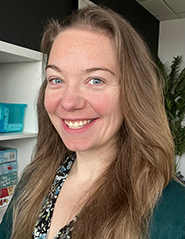 Hi there! I’m so thrilled to have rejoined Domestic and Sexual Violence Services with the ADAPT program in March 2024 after having served as a clinical intern during the 2014-15 school year. While there are still plenty of familiar faces, I am proud to be a part of a department that continues to grow and strives to improve its services in every way.
Hi there! I’m so thrilled to have rejoined Domestic and Sexual Violence Services with the ADAPT program in March 2024 after having served as a clinical intern during the 2014-15 school year. While there are still plenty of familiar faces, I am proud to be a part of a department that continues to grow and strives to improve its services in every way.
As an ADAPT counselor, I work with individuals who have previously chosen to use violence in their relationships but who are now striving to learn different strategies. I facilitate both men’s and women’s groups in English. I will admit that prior to my clinical internship, I had no idea ADAPT existed! I am forever grateful I was lucky enough to end up where I did because my internship shaped both who I am as an individual and who I am as a clinician.
ADAPT groups were intimidating at first because of my lack of knowledge and my preconceptions about the type of person that would end up in group. I was genuinely surprised to instead find a room full of compassion, accountability, and humanity. It is truly a once-in-a-lifetime experience, and I feel so fortunate I lucked into such an opportunity.
Naturally, I have a special place in my heart for all of the interns and volunteers that help facilitate the ADAPT groups because we couldn’t do it without you! You bring such valuable perspectives and voices to the structure of the group and impact our community in a really important way. Each group is such a unique journey and learning experience, and I am always so thankful for the volunteers that choose to join us.
When I’m not in ADAPT mode, you’ll find me running after a (recently turned) 2-year-old, trying out a new local restaurant, or reading a good book. I’m always interested in new books or podcast recommendations, so send them my way! I am so looking forward to continuing my journey with Fairfax County and DSVS and hope to get an opportunity to work with you along the way!
Jennifer Entwhistle
ADAPT Counselor
 Have you taken the tried-and-true self-care ideas for a spin but didn’t find one that worked? It might be time to step away from the self-care comfort zone. Give one of these four a try:
Have you taken the tried-and-true self-care ideas for a spin but didn’t find one that worked? It might be time to step away from the self-care comfort zone. Give one of these four a try:
- Write letters to your future self. Whatever is bothering you right now, your future self has already gotten through it, so why not try writing letters to them and see what appears on the page? You might have questions, that, when you put them down in words, you’re able to find the answers. You may have specific hopes and dreams that feel more achievable when you break them down on paper. The process of taking time out to write (for your eyes only) can be both freeing and soothing.
- Create a fear ladder. If you’re experiencing anxiety or fear around a certain activity or situation, this can be a great way to take action in a gentle, caring way. The idea is that you create a fear ladder that features steps you can take to get you where you need to be. For example, say you have a blood test coming up and you’re afraid of needles. Your fear ladder may look something like this: 1. Imagine someone else having their blood taken. 2. Imagine yourself having your blood taken. 3. Hold a needle. 4. Watch a video of someone else having their blood taken. 5. Have your blood taken. This tool is a great self-care activity in the lead-up to something you’re apprehensive about, and it can be adapted to all sorts of scenarios, from public speaking to long flights.
- Spiritual activities. For some people, spiritual activities are a pillar of both their identity and their self-care. Whether it’s praying, attending a place of worship, or engaging with spirituality more broadly, this is something that can be transformative for believers. And though spirituality can be a private practice, it can also be a way of opening your social circle and connecting you with like-minded individuals.
- Worry time. Dedicating time to worrying can seem like a negative take on self-care but it could be just the well-being activity for you. The idea is simple: Instead of letting worries haunt you 24/7, dedicate a short amount of time to ponder them. Once that time is up, let go and move on.
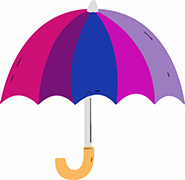 Bi Visibility Week is September 16-23. Domestic and Sexual Violence Services is observing the week with these book recommendations:
Bi Visibility Week is September 16-23. Domestic and Sexual Violence Services is observing the week with these book recommendations:
- Bisexuality: The Basics: Your Q&A Guide to Coming Out, Dating, Parenting and Beyond by Lewis Oakley. My partner doesn't believe I'm bisexual, what should I do? How should I approach sex with someone of a different gender for the first time? Can I reconcile being bisexual with wanting a biological child? Identifying as bisexual can be a pretty confusing experience--navigating experimentation versus orientation, at times presenting as a straight-passing member of a queer community, at other times having people discredit your attraction to multiple genders. Author Oakley knows every trick in the book--and he's here to answer your most burning questions
- Bi: The Hidden Culture, History, and Science of Bisexuality by Julia Shaw. In this book, psychological scientist Julia Shaw explores all we know about the world’s largest sexual minority through a personal journey that starts with her own openly bisexual identity and celebrates the resilience and beautiful diversity of the bi community. This rigorous and entertaining book will challenge us to think deeper about who we are and how we love.
- Swinging on the Garden Gate: A Memoir of Bisexuality and Spirit by Elizabeth Jarrett Andrew. Award-winning writer and teacher Elizabeth Jarrett Andrew describes a period of time in life when she came to know bisexuality as an embodied manifestation of divinity. In Swinging on the Garden Gate, she not only reconciles her United Methodist faith with her sexuality but also realizes her body and sexuality are holy. Andrew brings a distinctly queer feminist lens to Christian teachings and answers the question many young people have posed to her over the years: “Is it possible to be both queer and spiritual?”
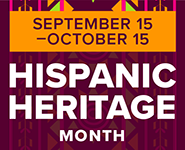 Hispanic Heritage Month is observed each year from September 15 to October 15 to celebrate the histories, culture, achievements, and contributions of American citizens whose ancestors came from Spain, Mexico, the Caribbean, and Central and South America. This time period encompasses the Independence Day celebrations of multiple Latin American countries, including Costa Rica, El Salvador, Guatemala, Honduras, Nicaragua, Mexico, and Chile. It also includes Día de la Raza on October 12, a holiday celebrating the combining of Spanish and indigenous culture in Latin America. Hispanic and Latin communities are incredibly diverse in cultural background, experiences, and needs, and assessing the impact of domestic and sexual violence on such a wide group can be difficult to encompass. Learn more about how Hispanic Heritage Month and interpersonal violence intersect.
Hispanic Heritage Month is observed each year from September 15 to October 15 to celebrate the histories, culture, achievements, and contributions of American citizens whose ancestors came from Spain, Mexico, the Caribbean, and Central and South America. This time period encompasses the Independence Day celebrations of multiple Latin American countries, including Costa Rica, El Salvador, Guatemala, Honduras, Nicaragua, Mexico, and Chile. It also includes Día de la Raza on October 12, a holiday celebrating the combining of Spanish and indigenous culture in Latin America. Hispanic and Latin communities are incredibly diverse in cultural background, experiences, and needs, and assessing the impact of domestic and sexual violence on such a wide group can be difficult to encompass. Learn more about how Hispanic Heritage Month and interpersonal violence intersect.
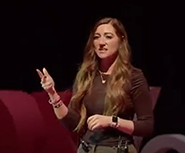 In today's world, mental health and suicide prevention must become a top priority. As suicide is a leading cause of death in Americans, it's also the most preventable. How do we even begin to make a difference? With the right tools and resources, the power of community can help heal our broken world, one person at a time. It starts right here. It starts with you, says Haley DeGreve, president and founder of The Gray Matters Collective, a mental health awareness and suicide prevention non-profit. Give a listen to Mental Health, Suicide, and the Power of Community, a TED Talk about how community can help save lives.
In today's world, mental health and suicide prevention must become a top priority. As suicide is a leading cause of death in Americans, it's also the most preventable. How do we even begin to make a difference? With the right tools and resources, the power of community can help heal our broken world, one person at a time. It starts right here. It starts with you, says Haley DeGreve, president and founder of The Gray Matters Collective, a mental health awareness and suicide prevention non-profit. Give a listen to Mental Health, Suicide, and the Power of Community, a TED Talk about how community can help save lives.
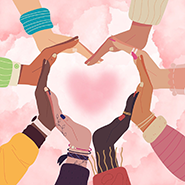 “Charity knows neither race nor creed.”–Talmud
“Charity knows neither race nor creed.”–Talmud
Each newsletter will include this section to help share reviews, spotlight the people who support Domestic and Sexual Violence Services, recognize birthdays and list upcoming trainings and meetings.
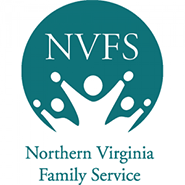 Northern Virginia Family Service Provides a Century of Support
Northern Virginia Family Service Provides a Century of Support
Northern Virginia Family Service (NVFS), established in 1924 to help families in need, has expanded its services over the decades to help families become stable and self-sufficient, lifting people out of poverty to hopeful futures. Volunteer Voices sat down with Paola Sandoval-Moshenberg, director of NVFS’ Multicultural Center, to talk about the nonprofit and its partnership with the Domestic Violence Action Center (DVAC). This is an excerpt of that conversation.
 Domestic and Sexual Violence Services’ podcast, Unscripted: Conversations about Sexual and Domestic Violence, is a year old this month! Stay in the know with these biweekly discussions, including this Season 1 throwback to observe Bi Visibility Week, Violence in LGBTQ+ Relationships.
Domestic and Sexual Violence Services’ podcast, Unscripted: Conversations about Sexual and Domestic Violence, is a year old this month! Stay in the know with these biweekly discussions, including this Season 1 throwback to observe Bi Visibility Week, Violence in LGBTQ+ Relationships.
Tanisha Cox, DSVS’ volunteer manager, joined the division in 2021, while the country was still in the throes of the pandemic. Organizing DSVS’ 100+ volunteer corps is no small feat. “My primary goal is to support those who help others, so my role is fundamentally about building and maintaining relationships,” she says. “Each day, I consciously choose to handle these relationships with the same care and attention I would give to a newborn baby. They require love, attention, care, their basic needs to be met, and a great deal of nurturing.”
On any given day, you might find Tanisha concentrating on projects aimed at enhancing volunteer services overall or working on initiatives that could affect the entire division. And there are days when she meets with volunteers to discuss the impact of their work and assess whether DSVS has contributed positively to their volunteer experience. “No two days are alike in my role,” she says. “I have the wonderful opportunity to interact with the entire division in various capacities.”


 “Simone Biles Rising”
“Simone Biles Rising”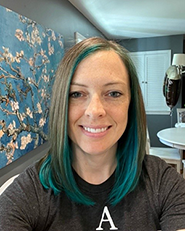 Meet Amanda Snelgrove, HASA (Hospital Accompaniment Support Advocate) and Hotline Volunteer
Meet Amanda Snelgrove, HASA (Hospital Accompaniment Support Advocate) and Hotline Volunteer
.png)

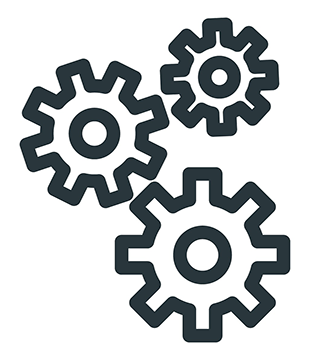
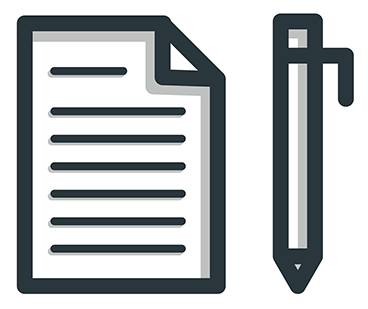
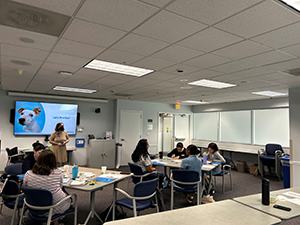 New volunteers participate in Welcome to DSVS, a new training the division offers.
New volunteers participate in Welcome to DSVS, a new training the division offers.